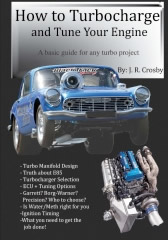| What's Hot! | Products/ Tools | EFI Tuning | Basic Tuning | Advanced Tuning | Chassis Tuning | Advertise with us |
Coolant Selection
Water has a higher specific heat than an ethylene glycol or propylene glycol coolant mix. Therefore, it provides the best heat transfer performance in a cooling system. If a cooling system is marginal, that is, it only overheats on the hottest of days, then running with water as a coolant in the summer and an ethylene glycol or propylene glycol coolant solution during the rest of the year will probably solve the problem. Commercial coolant solutions provide cooling, anti-freeze protection, corrosion inhibitors to protect the metals in the cooling system, and a lubricant for the water pump. When running water as a coolant for maximum heat transfer, a product that provides a corrosion inhibitor and water pump lubricant should be added to the water.
In terms of the relative heat transfer performance of ethylene glycol versus propylene glycol coolant bases, they are pretty much equal when mixes according to the manufacturers’ recommendations, usually a 50/50 water to glycol mix. Ethylene glycol coolant solutions provide slightly higher heat transfer performance over propylene glycol solutions at low coolant flow rates.
-IMPROVEMENT RULE- #9 For maximum heat transfer performance in warm climates, use water as a coolant with an additive to provide a corrosion inhibitor and water pump lubricant.For winter service, use a 50/50 water to ethylene glycol coolant solution that includes corrosion inhibitors and a pump lubricant.
Aluminum vs. Copper/Brass Radiators
Copper is a better conductor of heat than aluminum. Copper/brass radiators usually have copper fins, but brass tubes (70% copper, 30% zinc). The bond between the fins and the tubes may be made with soldier (A tin/lead alloy, or high-tin alloy) or with a braze material (mostly copper).
Page 7/7
ATTENTION READER:
If you enjoyed the information and article you just read be sure to check out our newly released book with even more exciting photo's and information:How to Turbocharge and Tune your Engine

Want to know more about your particular Make and Model vehicle? All of these vehicles are covered in the tech, maintenance and repair articles found above. Enginebasics is the wiki or wikipedia of car part, repair, how to and tuning information. Let us be the class 101 for your automotive learning.
| Ford | General Motors GM | Pontiac | Jaguar | Land Rover | Nissan |
| Toyota | Honda | Lexus | Acura | Lotus | Scion |
| Infinity | BMW | Mercedes | Mitsubishi | Ferrari | Maserati |
| Lamborghini | Volks Wagen VW | Saab | Audi | Hyundai | Kia |
| Subaru | Mazda | Chevy | Volvo | Caddilac | Dodge |
| Chrylser | Daewoo | Porsche | Mercury | Freightliner | MG |
Individual Models
| Ford Mustang | Mitsubishi Eclipse | Mitsubishi Evo | Subaru WRX / STI | Dodge Viper | Chevrolet Corvette |
| Nissan Skyline | Honda S2000 | Nissan 350z | Toyota Supra | Chevy Camaro | Lotus Elise Exige |
| Honda Civic | VW Golf | Dodge SRT-4 | Eagle Talon | Acura Integra | BMW M3 |
| Nissan 240sx | Porsche 911 | Acura NSX | Honda Accord | Toyota Camry | Toyota MR2 |
| VW R32 | Dodge Truck | Mazda Rx7 | VW Jetta | Sand Buggy | Nissan Sentra |
For the latest Automotive news and stories visit the websites below |
Our feature Build: An AWD V6 Civic





